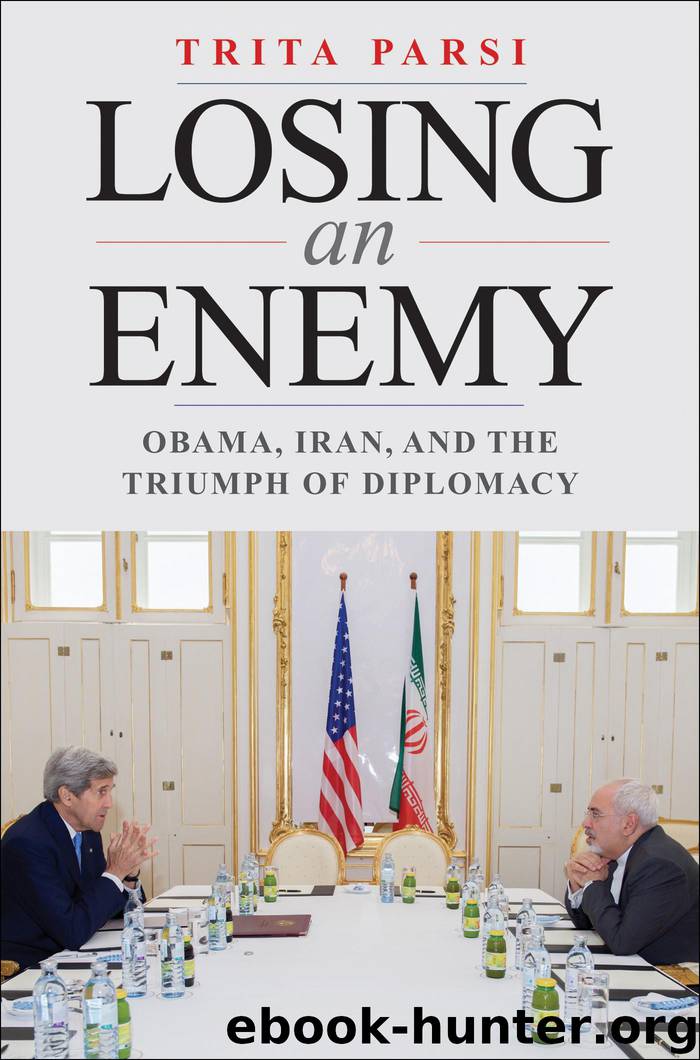Losing an Enemy by Trita Parsi

Author:Trita Parsi
Language: eng
Format: mobi, epub
Publisher: Yale University Press
Published: 2017-10-14T21:00:00+00:00
France’s Temper Tantrum
It was a tense atmosphere on November 8, when the P5 + 1 and Iran reconvened in Geneva. The United States put all of its cards on the table during the plenary session and fully revealed how far the secret negotiations had advanced. The U.S. side presented the draft deal, and the Iranians quickly affirmed they were in agreement. With the two principals of the conflict in agreement, the only remaining step—getting the rest of the P5 + 1’s approval—seemed merely ceremonial. But Washington had underestimated France’s injured pride. Publicly, French Foreign Minister Laurent Fabius complained that the American-Iranian text was weak on the Arak plutonium plant. But at the negotiations, his objections were procedural—that is, rooted in French anger over the United States negotiating with Iran behind France’s back. “They were faced with what was already a highly developed text and felt that the Americans simply wanted them to endorse it,” Ravanchi said.39
The French knew exactly what to strike from the agreement to make the Iranians walk. While the Iranians had already secured acceptance of enrichment on Iranian soil (with restrictions), their objective was to ensure that Iran’s file would eventually be “normalized”; in other words, once Iran had satisfied the concerns of the international community, Iran would enjoy the same freedoms and restrictions as all other members of the NonProliferation Treaty (NPT). Otherwise, Iran would risk being put permanently in a separate category. This would be unacceptable to Tehran—just as Iran had to accept limitations for a period of time as a result of its past violations, the West had to come to terms with the fact that once Iran had restored trust, it could no longer be treated differently from other NPT states, Iran maintained. Otherwise, Iran would be the only party to the NPT in good standing that nevertheless enjoyed less rights than all other NPT and all non-NPT states. Such a scenario would strengthen the voices of those in Iran favoring exiting the NPT altogether. The original draft presented to the P5 + 1 by the United States included language specifying that Iran’s future enrichment would be within the confines of the NPT—that is, Iran’s case would be normalized. The French insisted that the reference to the NPT be struck, which predictably caused a deadlock with the Iranians.40
All efforts to compromise with Fabius failed as it became clear that the French intent was to block a deal, not improve the text. When U.S. officials “spoke with him bilaterally and asked what positions he was not comfortable with—he had almost no answer to that question,” a senior administration official said. After a late evening ministerial meeting on November 9, where the sides once again failed to satisfy Fabius, the French foreign minister quickly exited the room and rushed over to the hotel lobby where the media had congregated. There, against protocol, he announced that the talks had failed. “There is an initial text that we do not accept,” Fabius said, adding that France would not fall for a “fool’s game.
Download
This site does not store any files on its server. We only index and link to content provided by other sites. Please contact the content providers to delete copyright contents if any and email us, we'll remove relevant links or contents immediately.
| Anthropology | Archaeology |
| Philosophy | Politics & Government |
| Social Sciences | Sociology |
| Women's Studies |
The Secret History by Donna Tartt(19010)
The Social Justice Warrior Handbook by Lisa De Pasquale(12179)
Thirteen Reasons Why by Jay Asher(8878)
This Is How You Lose Her by Junot Diaz(6866)
Weapons of Math Destruction by Cathy O'Neil(6253)
Zero to One by Peter Thiel(5776)
Beartown by Fredrik Backman(5722)
The Myth of the Strong Leader by Archie Brown(5487)
The Fire Next Time by James Baldwin(5418)
How Democracies Die by Steven Levitsky & Daniel Ziblatt(5207)
Promise Me, Dad by Joe Biden(5135)
Stone's Rules by Roger Stone(5070)
A Higher Loyalty: Truth, Lies, and Leadership by James Comey(4942)
100 Deadly Skills by Clint Emerson(4904)
Rise and Kill First by Ronen Bergman(4766)
Secrecy World by Jake Bernstein(4733)
The David Icke Guide to the Global Conspiracy (and how to end it) by David Icke(4691)
The Farm by Tom Rob Smith(4494)
The Doomsday Machine by Daniel Ellsberg(4477)
